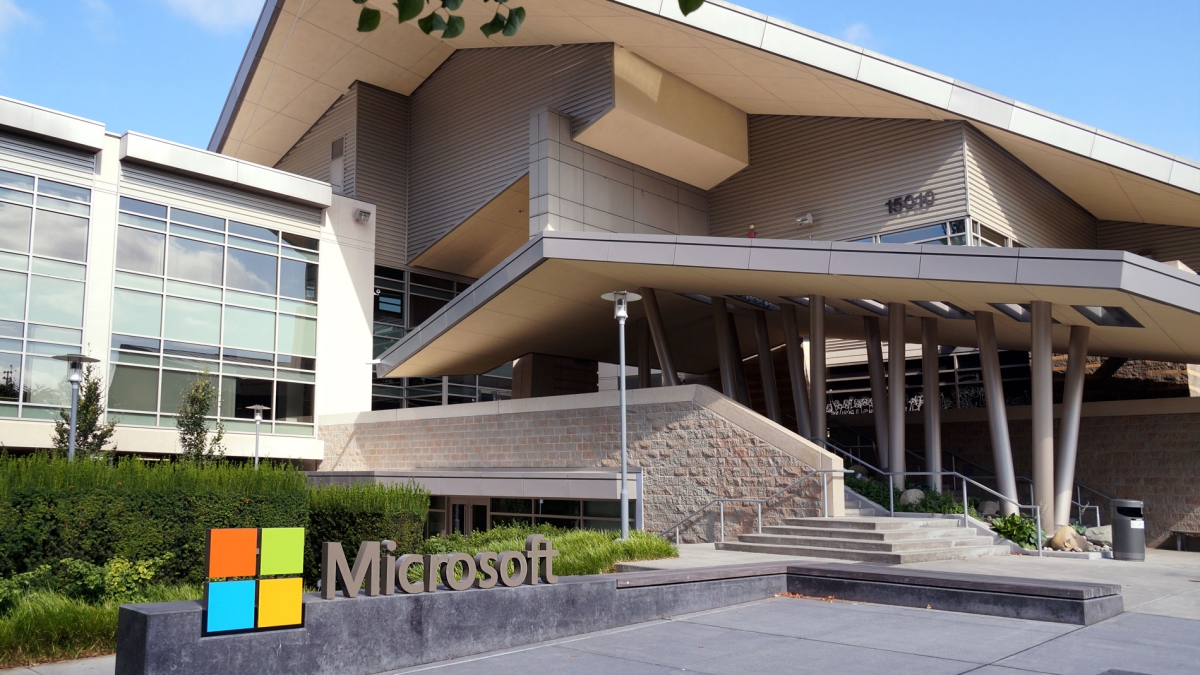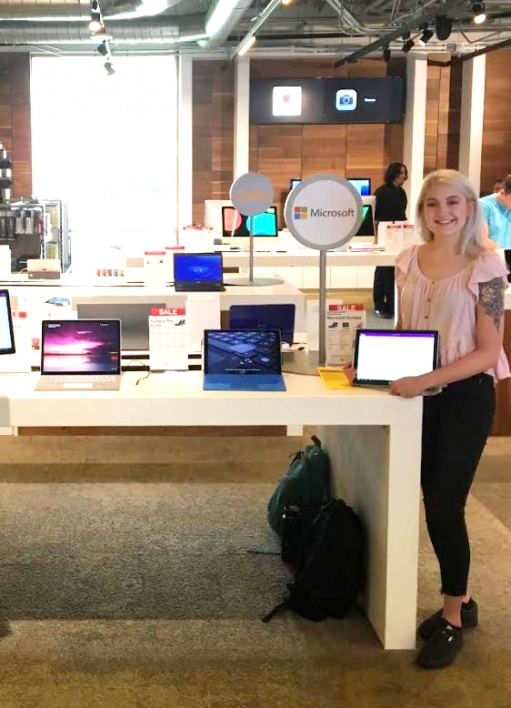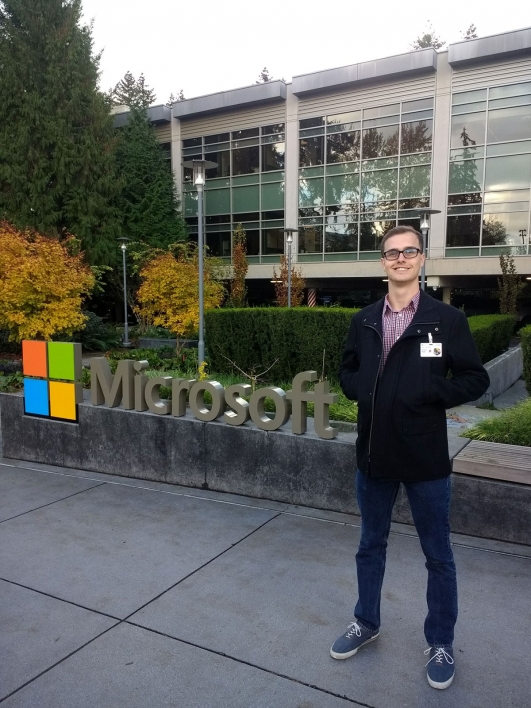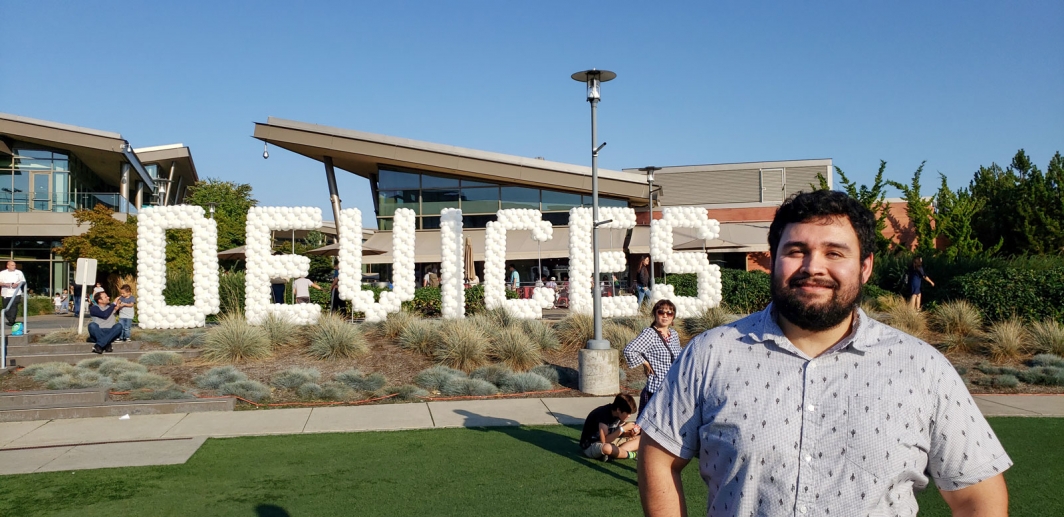How engineering grads get their dream jobs

Microsoft's headquarters in Redmond, Washington. The Ira A. Fulton Schools of Engineering Career Center at Arizona State University works closely with high-profile companies, including Microsoft, to build relationships and invest in the future of a diverse engineering and technology workforce. Through these partnerships and extracurricular opportunities, Fulton Schools graduates are preparing for top tech jobs. Photo courtesy of vladdon/Shutterstock.com
For someone who grew up playing Xbox, working for Microsoft Devices — the team behind that gaming console and many other devices people use every day — is the definition of a dream job. And it could be your dream job, if you’re an engineering major in the Ira A. Fulton Schools of Engineering at Arizona State University.
Such high-profile jobs may seem out of reach for some, but they’re not impossible to get — and companies like Microsoft are always looking for new, highly qualified talent.
Fulton Schools students and graduates stand out among the competition for several key reasons: among them, the Fulton Schools Career Center’s extensive resources and relationships with Microsoft and other high-profile companies, and the opportunities at the Fulton Schools designed to help students to build their skills and passion for engineering.
“I’m not aware of any other engineering career centers with collaborations to the degree and volume we have,” said Robin Hammond, director of career services in the Fulton Schools. “The opportunities and mechanisms for students and employers to connect are more than just in the career center; they’re a culture in the Fulton Schools.”
This environment has led to success for many Fulton Schools graduates, including several alumni who now have what they consider to be their dream jobs at Microsoft Devices.
Networking and relationship-building for rewarding careers
A shared commitment to diversity and innovation has driven the relationship between ASU and Microsoft Devices.
“We’re investing in each other, and students are an extension of that relationship and investment,” Hammond said. “They want to see our students succeed as much as we do, and that’s what makes this special.”
Many big-name companies regularly connect with students in a variety of ways outside of traditional career fairs.
Working engineers and technologists as well as recruiters host information sessions and informal coffee chats to help get conversations going between professionals, alumni and students. They also conduct resume reviews, get involved in the classroom, attend student organization meetings and judge competitions.
Ira A. Fulton Schools of Engineering electrical engineering alumna Mary Byron worked at Microsoft marketing events as a Microsoft Ambassador while she was an undergraduate student. Photo courtesy of Mary Byron
Mary Byron, a Fulton Schools electrical engineering alumna who graduated in December 2018, is a product engineer for Xbox at Microsoft Devices and has also worked for Microsoft’s radio frequency development team.
As a student, Byron attended coffee chats, a session with Microsoft Devices at a meeting of the ASU section of the Society of Women Engineers and other career events where she asked many questions so recruiters would remember her.
“I believe persistence and familiarizing myself with the ones doing the recruiting helped me through the pipeline,” Byron said.
The key for students to get involved in the university-industry employer relationship is Handshake, a platform that brings together students, alumni and employers.
Employers often go straight to Handshake to post information sessions, interviews, internships, job opportunities and more. There, they can connect with students directly. So Hammond recommends students regularly check Handshake to seek out opportunities to learn about employers and go talk to them.
Gaining experiences through getting involved
While showing up to industry-hosted events is important, there’s a lot of legwork students need to do on their own to make themselves stand out to employers, Hammond said.
“It’s critical to think outside of the standard curriculum and about the ways in which you can grow your skills and your technical knowledge,” she said.
Ira A. Fulton Schools of Engineering electrical engineering alumnus Richard Rigby poses by a Microsoft sign at the company's headquarters in Redmond, Washington. Photo courtesy of Richard Rigby
Richard Rigby graduated in December 2020 with an electrical engineering bachelor’s degree. He’s now an electrical engineer at Microsoft Devices working on the Surface Book and Laptop team where he designs schematics, facilitates layout design and debugs circuit boards in current and future Surface devices.
Rigby took advantage of Fulton Difference opportunities as a student, but in hindsight, he believes he could have stood out more if he had been more involved in an engineering club.
“Engineering clubs where you work with a team on a big project through multiple semesters is probably some of the best experience you can get as a student,” Rigby said. “Not only do you get relevant technical skills, but you also get new, exciting projects that you can put on your resume and brag about in your interviews.”
Becoming adept in a particular field can be accomplished in many ways: doing independent or group projects outside of school requirements, reading books on the topic, joining working groups on Facebook or LinkedIn. Sometimes students may need to figure out their “why” — the reason students really want the type of job they want — so students should get curious and explore. The key to success here, Hammond says, is to do it because you love your field of study and you have a passion that will make an impression on employers.
That’s where the Fulton Difference comes in. This guiding principle of the Fulton Schools partly focuses on fostering success beyond the classroom through extracurricular activities to enhance students’ experiences and skill-building.
Researching careers and companies
Students should also spend time learning about companies before meeting with their representatives. This helps students see how their passion aligns with the company’s vision.
One of the most important things a student can do, Hammond says, is conduct research about a company. Much of this is individual work, looking into products and services, how the company functions and even investment reports. Together, this information can provide the same sort of knowledge a first-day employee would have.
“Understanding the company from a first-day employee mindset helps you walk into an interview with more information about the organization, more confidence and the ability to ask questions about the company’s vision statement and goals and their plan to get to the next level,” Hammond said. “You’re connecting with them as a potential future teammate, and that shows a maturity, an awareness and how you are making the same type of investment in this process that they’re putting in you.”
Altogether, cultivating a passion for engineering, gaining experiences and knowing a company at the level of a new employee will set students apart.
“If you have that passion and share it with a first-day employee mindset, those things come together and will propel you to the next level,” Hammond said.
Samuel Perez Diarte is fascinated by the inner workings of electronics. The May 2018 electrical engineering graduate explored this field as an undergraduate student through a variety of activities outside the classroom. He found an internship opportunity with Microsoft Devices that aligned with his goals, which contributed to him landing his current job.
“I realized that this was what I wanted to do when I got to travel to China and take devices apart for investigations,” said Perez Diarte, who also earned a minor in business. “I’ve always loved taking things apart for fun just to try to figure out how things work, but now I was getting paid for it.”
Samuel Perez Diarte, an Ira A. Fulton Schools of Engineering electrical engineering alumnus, attends a Microsoft Devices celebration event in September 2019. Photo courtesy of Samuel Perez Diarte
Putting it all together with the Fulton Schools Career Center
From first-year students to alumni, the Fulton Schools Career Center has resources to help navigate the entire career planning process.
The Fulton Schools Career Center helped Rigby prepare through resume reviews with the peer career coaches — other Fulton Schools students who are trained to help with career readiness. Rigby was a peer career coach too, so he knew the value of such a resource.
“I cannot express how dramatic a transformation my resume went through getting so many trained eyes on it,” Rigby said. “They had a sample resume that was created from feedback from top industry professionals, which was extremely helpful for formatting references and seeing what content my resume was missing.”
The peer career coaches also helped him make effective LinkedIn and Handshake profiles for networking and reiterated the importance of attending company recruiting events, which got him in the door at Microsoft Devices.
He encourages current Fulton Schools students to make time for an appointment at the career center.
“The most challenging aspect of the internship and job search is knowing where to start,” Rigby said, "especially with all the stress of homework and exams on an engineering student’s mind. You will gain a lot of clarity about your next steps, and you’ll have a new resource for asking career questions any time.”
More Science and technology

Cracking the code of online computer science clubs
Experts believe that involvement in college clubs and organizations increases student retention and helps learners build valuable…
Consortium for Science, Policy & Outcomes celebrates 25 years
For Arizona State University's Consortium for Science, Policy & Outcomes (CSPO), recognizing the past is just as important as…

Hacking satellites to fix our oceans and shoot for the stars
By Preesha KumarFrom memory foam mattresses to the camera and GPS navigation on our phones, technology that was developed for…


